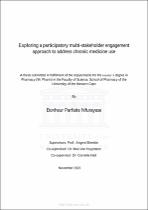Exploring a participatory multi-stakeholder engagement approach to address chronic medicine use
Abstract
Background: In South Africa, chronic diseases (CD) fall into the quadruple burdens of diseases. In 2018 the World Health Organization (WHO) reported that chronic diseases were responsible for more than fifty percent of premature deaths. This report followed South Africa’s announcement in 2016 that CDs accounted for forty-nine percent of all total deaths. Globally and locally in South Africa, many progressive policies, strategic documents and interventions to address CDs remain commendable. However, the prevalence and burden of CDs on national healthcare systems and community health is concerning. Consequently, newer and revised approaches and strategies prioritising multi-government and multi-stakeholder collaborations are gaining popularity. Moreover, Participatory Action Research (PAR) and its founding principles as an approach to addressing healthcare issues are gaining momentum. Disappointingly such approaches within chronic disease contexts remain underexplored in South Africa. Bearing these considerations in mind, we explored the use of a Participatory multi-stakeholder engagement approach to address chronic medicine use issues (CMU) within an underserved community in the Western Cape. Our collaborative research project commenced in 2018 in a unique research setting that boasted pre-established partnerships between a pharmacy School and its services partners (NGO and CHWs). These service partners connected the School to surrounding communities through one of their experiential learning programmes, Service Learning in Pharmacy (SLiP).

